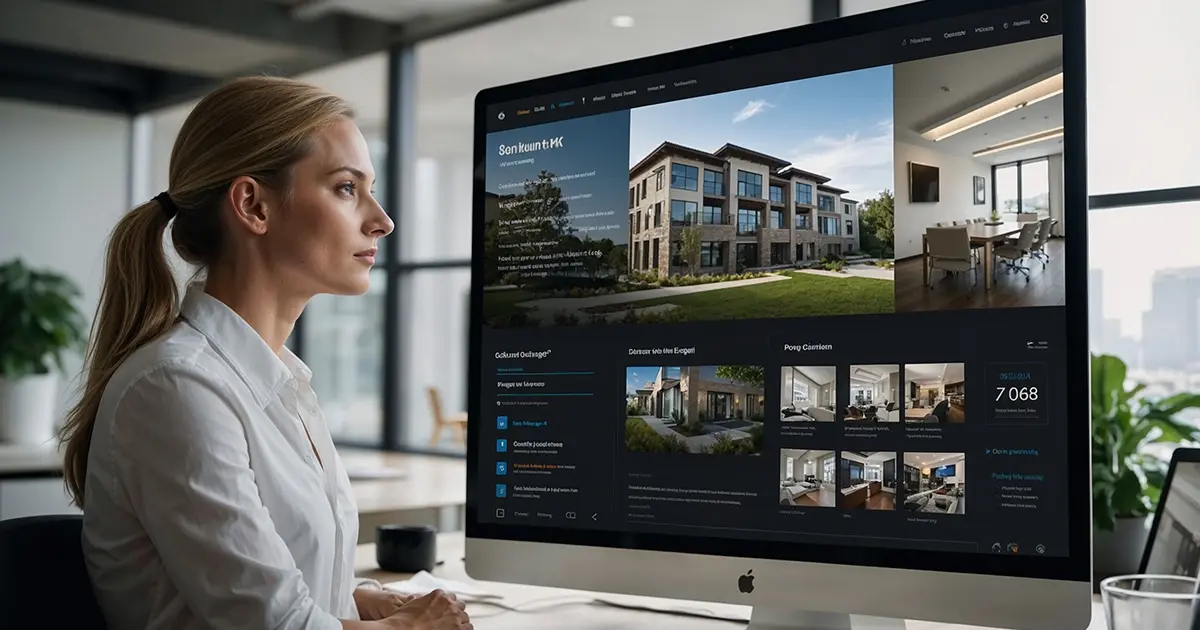Real Estate Websites Optimized with AI: Get More Clients
With AI tools like ChatGPT, Leonardo AI, and Runway, real estate agents can create professional websites that attract customers and increase profits. By investing in AI-powered content creation for text, images, and video, agents can build an engaging digital presence that sets them apart and ensures a steady flow of leads. Here’s a breakdown of effective AI tools and how they can transform a real estate website into a client-attracting powerhouse.
Why your website is the real estate agent’s new power suit
In real estate, the first impression often comes from a website, not a face-to-face meeting. A polished online presence can be a game changer, showing potential clients that you’re ahead of the competition. Just as a tailored suit once signified professionalism, your website must now speak for you, reflecting expertise and market knowledge. An outdated website, on the other hand, tells visitors that the agent may not be keeping up with the times. By investing in AI-driven tools to create a visually appealing, informative, and optimized website, agents can make a strong first impression that drives leads and closes deals.
The hidden cost of an outdated website: Lost customers and missed business
A website with an outdated design and clunky navigation is more than just an eyesore – it sends the message that you’re behind the times. Today’s customers expect fast-loading, visually appealing and intuitive websites that showcase property highlights and agent expertise. AI tools provide a solution for transforming outdated websites into modern customer magnets. Prospects are more likely to browse listings, read testimonials, and even book appointments directly from a well-designed website. When customers have a seamless experience, they are more likely to trust the agent’s skills and schedule an appointment.


Top AI tools for real estate websites: Boost engagement and close deals
To help you improve your website, here’s a list of powerful AI tools for creating compelling text, images, and video that will enhance your online presence and attract more clients.
By incorporating these tools, agents can save on traditional marketing costs while improving the visual appeal and readability of their websites.
Real estate website transformation: Practical steps for immediate impact
Ready to get started? Follow these steps to apply AI tools to your real estate website:
- Create text content: Use ChatGPT to develop engaging property descriptions, FAQs or blog posts that build trust with customers. High-quality content reassures visitors and demonstrates your industry expertise.
- Enhance visuals: Leonardo AI and Midjourney can create custom images for listings or “About” pages that help visually brand your business and increase site engagement.
- Add video tours: With Runway, you can create personalized video tours of properties or produce videos that introduce you as an agent. Studies show that video content keeps customers engaged longer and increases the likelihood of a sale.
- Regular updates: AI tools make it easy to update your content frequently. Add new listings, update images, and keep the site current to show customers you’re active in the market
These steps can help your site stand out, keep customers engaged, and increase your chances of converting visitors into leads.

Key Elements of an AI-Enhanced Real Estate Website
With AI, agents can customize their websites with elements that engage customers and build trust. Consider these critical features to increase customer loyalty and boost sales:
- Optimized descriptions: Catchy text that highlights key property features to keep customers interested.
- Professional images: Modern, high-quality images that create visual appeal.
- Dynamic videos: Personalized videos for virtual tours or introductions to keep customers engaged.
- User-friendly design: AI-powered chatbots and streamlined navigation guide customers to book consultations.
- Regularly updated content: Content that reflects market trends and demonstrates your expertise to customers.
These features enhance the user experience and maximize the potential for customer engagement and lead generation.
Traditional vs. AI-driven websites: Why AI wins for customer engagement
Unlike traditional websites, which are static and often outdated, AI-powered websites are dynamic and can quickly adapt to changing customer preferences. They allow agents to add personal touches, such as chatbot support and virtual tours, that can’t be easily achieved on a traditional website. As the market evolves, AI tools provide the flexibility to easily adjust content, images, and videos, helping agents stay relevant and customer-centric. This customization creates a lasting impression on site visitors, increasing the agent’s chances of capturing leads.

Getting started with AI tools: A beginner’s guide
Getting started with AI tools is straightforward, and most applications are compatible with both desktops and mobile devices. Here’s a step-by-step guide:
- Download the tool: Select the AI application you need and install it on your device.
- Create a free account: Sign up to explore the available features; many platforms offer a free version to get you started.
- Start small: Try simple tasks, such as using ChatGPT to create a property description or Leonardo AI to create a simple image.
- Seek support: Take advantage of the tutorials and community forums available on most platforms to help you get the most out of each tool.
As you explore these features, you’ll quickly discover how AI can increase your site’s effectiveness and customer appeal.
AI-powered websites as a strategy for real estate success
AI-powered websites are more than just visually appealing – they capture prospects and keep them engaged. Unlike traditional websites, AI-powered websites can actively respond to customer needs with dynamic content, personalized tours, and automated responses. As a result, agents who adopt AI technology experience increased engagement and higher lead generation rates, giving them an edge in the competitive real estate market. By leveraging these tools, agents can more effectively showcase properties and services, attract more clients, and ultimately increase revenue.

















